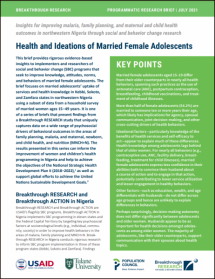Health and Ideations of Married Female Adolescents
This brief provides rigorous evidence-based insights to social and behavior change (SBC) program implementers and researchers seeking to improve health-related knowledge, attitudes, norms, and behaviors of married female adolescents.
The brief focuses on married adolescents’ uptake of services and health knowledge in Kebbi, Sokoto, and Zamfara states in northwestern Nigeria. Findings show that married female adolescents ages 15–19 differ from their older counterparts in nearly all health behaviors. Ideational factors—particularly knowledge of the benefits of health services and self-efficacy to act—appear to explain much of these differences.
This is one of a series of briefs that present findings from a Breakthrough RESEARCH study in Nigeria that uniquely captures data on a wide range of psychosocial drivers of behavioral outcomes in the areas of family planning, malaria, and maternal, newborn, and child health, and nutrition.
Source: Population Council/Breakthrough RESEARCH
Date of Publication: September 19, 2021
SIMILIAR RESOURCES
Tools
Examples
- Lever les Tabous: La sexualité et les approches promouvant l’égalité des genres pour mettre fin aux unions et aux mariages d’enfants, précoces et forcés
- Tackling the Taboo: Sexuality and Gender-Transformative Programmes to End Chlld, Early, and Forced Marriage and Unions
- Prioritizing and Targeting SBC Investments for Youth
- COVID-19 and Child, Early, and Forced Marriage: An Agenda for Action
- Factors Impacting Use of Health Services by First-time/Young parents: A Formative Research Toolkit
- “Because my Husband and I Have Never Had a Baby Before…” Results and Lessons from Interventions with First-Time Parents in Madagascar, Mozambique, and Nigeria
- Child Marriage Facts and Figures
- Child Marriage Factsheets
- Millions More Cases of Violence, Child Marriage, Female Genital Mutilation, Unintended Pregnancy Expected due to the COVID-19 Pandemic
- Using Social & Behavior Change To Improve Family Planning Outcomes / Utilisation du Changement Social et Comportemental pour Améliorer le Bilan du Planning Familial en Afrique de l'Ouest

